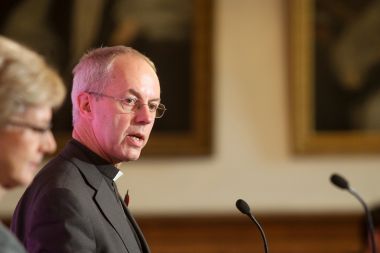Archbishop Justin Welby diagnosed with pneumonia

The Archbishop of Canterbury has been diagnosed with pneumonia after failing to deliver his Christmas sermon at Canterbury Cathedral yesterday.
Archbishop Justin Welby was initially said to be suffering from a severe cold, but Lambeth Palace today confirmed that he was diagnosed with the respiratory tract infection on Thursday afternoon.
A spokesperson told the Telegraph that Welby now requires "bed rest for a few days", while his daughter tweeted that the Archbishop is now "on the mend".
Just to flag it up - dad's severe cold turned out to be pneumonia. On the mend now thanks to brill NHS coming to visit yesterday!
— Katharine W-R (@kwelbyroberts) December 26, 2014The Dean of Canterbury, the Very Rev Robert Willis, delivered a homily yesterday instead. It is the first time in living memory that an Archbishop of Canterbury has failed to preach in the Mother Church of the Anglican Communion on the Christian festival that celebrates the birth of Christ.
It prompted speculation on Twitter of censorship that was condemned by sources as "ridiculous".
The Responsible Citizens' Alliance tweeted: "Rumors abound that @JustinWelby Archbishop of Canterbury refuses to give Christmas sermon as censored by govt. He will blame a bad cold." The alliance then followed up with: "a doom and gloom message was expected warning of no fairytale soloutions." A subsequent tweet read: "Would a cold stop u from doing ur job on most important day of your year?"
Downing Street declined to comment.
A source told Christian Today that it was "totally ridiculous" to suggest there had been any attempt at censorship and that it would be unheard of by both Church and State for any UK government to attempt such a thing.
A spokesman for Lambeth Palace said: "Complete rubbish! Heavy cold is the absolute truth!"
In a statement, Lambeth Palace said: "The Archbishop of Canterbury, the Most Revd Justin Welby, is suffering from a severe cold and will, with great regret, no longer be preaching the sermon at Canterbury Cathedral this morning. The Dean of Canterbury, the Very Revd Robert Willis, will deliver a homily."
The text of the Archbishop's sermon was instead published as a Christmas message on his website shortly after 11am.
Archbishop Welby has had a hectic year. He has travelled the world, visiting every one of the 44 provinces and churches of the worldwide Anglican Communion, most recently Sierra Leone, ravaged by Ebola. He was tested for the virus yesterday, but received the all clear.
Archbishop Welby referred in his message to the Ebola crisis as well as the Christmas Day truce in the World War One trenches in 1914. "The truce illustrates something of the heart of Christmas, whereby God sends his Son, that vulnerable sign of peace, to a weary war-torn world. The problem is that the way it is told now it seems to end with a 'happy ever after'," the Archbishop said.
The following day the war continued with the same severity, he noted. "Nothing had changed; it was a one-day wonder. That is not the world in which we live - truces are rare."
He was concerned about the fate of Christians in the Middle East. "Today there is no Christmas truce in the Middle East, or in north-east Nigeria where Christians are persecuted, with other minorities."
He said Jesus came to the reality of this world "to transform that reality", not take us into some "fantasy kind of happy ever after".
"He comes to lives that can too easily get caught up in acquiring, amassing, consuming and self-obsessing, bringing a shift in our horizon – beyond ourselves, to those who don't have what we have. If we hear this story properly we look away from ourselves, from our life with its care and burdens. This is freedom: as our perspective widens, so we are healed."
Earlier, the Archbishop of Westminster Vincent Nichols said in a homily at Midnight Mass at Westminster Cathedral that Jesus taught compassion for the hungry and displaced.
He said: "Well-known facts cease to be abstract, distant problems become the story of our brothers and sisters, our own flesh and blood. They call out to us for recognition and assistance."











